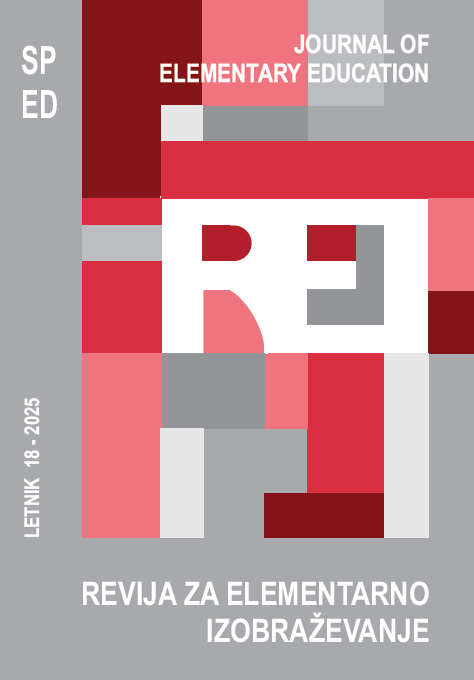Reflektivna metoda WANDA kot orodje za izboljšanje dobrobiti učiteljev
DOI:
https://doi.org/10.18690/rei.5403Ključne besede:
WANDA, dobro počutje, dobrobit učiteljev, PERMA.Povzetek
V kvalitativni raziskavi se osredinjamo na dobrobit učiteljev v okviru refleksivne metode WANDA. Cilj je bil raziskati subjektivne zaznave učiteljev o koristih metode WANDA za njihovo dobro. Podatki so bili zbrani s kvalitativno tehniko pisnega intervjuja. Raziskovalni vzorec je sestavljalo 16 osnovnošolskih in predšolskih učiteljev, ki so opravili usposabljanje za izvajanje skupinske refleksije z metodo WANDA. Vsebinska analiza podatkov je bila izvedena z uporabo tematske analize na podlagi modela PERMA. Rezultati so pokazali, da metoda WANDA prispeva k dobrobiti učiteljev na naslednjih področjih: odnosi, pomen, pozitivna čustva in zavzetost. Najmanj zastopana je bila kategorija dosežki.
Prenosi
Literatura
Aldrup, K., Klusmann, U., Lüdtke, O., Göllner, R., and Trautwein, U. (2018). Student and teacher well-being: Testing the mediating role of the teacher-student relationship. Teaching and Teacher Education, 58, 126–136.
Braun, V., and Clarke, V. (2006). Using thematic analysis in psychology. Qualitative Research in Psychology, 3(2), 77–101.
Collie, R. J., Shapka, J. D., and Perry, N. E. (2012). School climate and social-emotional learning: Predicting teacher stress, job satisfaction, and teaching efficacy. Teaching and Teacher Education, 28(5), 718–727.
Cooperrider, D., and Whitney, D. (2006). Appreciative inquiry: A positive revolution in change. In P. Holman et al. (eds.), The change handbook. San Francisco: Berrett-Koehler Publishers, Inc. ISBN 8601200632934.
Csikszentmihalyi, M. (2009). Flow: The psychology of optimal experience. Harper Row.
De Schepper, B. et al. (2016). When WANDA meets ISSA: Group reflection for professional development in ECEC. Ghent.
Deci, E. L., and Ryan, R. M. (2008). Hedonia, eudaimonia, and well-being: An introduction. Journal of happiness studies, 9(1), 1-11. https://doi.org/10.1007/s10902-006-9018-1
European Commission/EACEA/Eurydice. (2021). Teachers in Europe: Careers, development and well-being. Eurydice report. Publications Office of the European Union.
Falk, D., Varni, E., Finder, J., and Frisoli, P. (2019). Landscape review: teacher well-being in low resource, crisis, and conflict-affected settings. Inter-agency Network for Education in Emergencies. https://inee.org/sites/default/files/resources/TWB%20Landscape%20Review_August%202019_0.pdf
Forgeard, M. J., Jayawickreme, E., Kern, M., and Seligman, M. (2011). Doing the right thing: Measuring well-being for public policy. International Journal of Well-being, 1(1), 79–106. https://doi.or–g/10.5502/IJW.V1I1.15
Fredrickson, B. (2001). The role of positive emotions in positive psychology: The broaden-and-build theory of positive emotions. The American Psychologist, 56(3), 218–226. https://doi.org/1–0.1037/0003-066X.56.3.218
Fredrickson, B. (2010). Positivity: Groundbreaking research reveals how to release your inner optimism and thrive. Oneworld.
Fredrickson, B. L. (2013). Positive emotions broaden and build. In P. Devine, and A. Plant (eds.), Advances in Experimental Social Psychology (Vol. 47, pp. 1–53). Academic Press.
Fullagar, C. J., and Kelloway, E. K. (2009). Flow at work: An experience sampling approach. Journal of Occupational Health Psychology, 14(3), 329–340.
Hascher, T., and Waber, J. (2021). Teacher Well-being: A Systematic Review of the Research Literature from the Year 2000–2019. Educational Research Review, 34, Article 100411. https://doi–.org/10.1016/j.edurev.2021.100411
Hascher, T., Beltman, S., and Mansfield, C. (2021). Teacher well-being and resilience: Toward an integrative model. Educational Research, 63(4), 416–439. https://doi.org/10.1080/00–131881.2021.1980416
Huppert, F. A., and So, T. T. C. (2013). Flourishing across Europe: Application of a new conceptual framework for defining well-being. Social Indicators Research, 110, 837–861. https://doi–.org/10.1007/s11205-011-9966-7
Kelchtermans, G. (2006). Teacher collaboration and collegiality: The case of peer coaching. Teaching and Teacher Education, 22(5), 601– 616.
Kern, M. L., Waters, L., Adler, A., and White, M. (2014). Assessing employee well-being in schools using a multifaceted approach: Associations with physical health, life satisfaction, and professional thriving. Psychology, 5(6), 500–513. https://doi.org/10.4236/psych.2014.56060
Konu, A., Viitanen, E., and Lintonen, T. (2010). Teachers' well-being and perceptions of leadership practices. International Journal of Workplace Health Management, 3(1), 44–57. https://doi.o–rg/10.1108/17538351011031939
Lambert, N. M., Graham, S. M., and Fincham, F. D. (2009). A prototype analysis of gratitude: Varieties of gratitude experiences. Personality and Social Psychology Bulletin, 35, 1193– 1207.
Paakkanen, M. A., Martela, F., and Pessi, A. B. (2021). Responding to positive emotions at work: The four steps and potential benefits of a validating response to coworkers' positive experiences. Frontiers in Psychology, 12. https://doi.org/10.3389/fpsyg.2021.668160
Romano, J. L., and Wahlstrom, K. (2000). Professional stress and well-being of K–12 teachers in alternative educational settings: a leadership agenda. International Journal of Leadership in Education, 3(2), 121–135. https://doi.org/10.1080/136031200292777
Seligman, M. E. P. (2011). Flourish: A visionary new understanding of happiness and well-being. Atria Books.
Seligman, M. E. P. (2011). Well-being: The five essential elements. Free Press.
Seligman, M. E. P. (2012). Flourish: A visionary new understanding of happiness and well-being. Free Press.
Seligman, M. E. P. (2018). PERMA and the building blocks of well-being. The Journal of Positive Psychology, 13(4), 333–335.
Smetáčková, I., and Francová, V. (2020). Souvislosti mezi vnímanou kvalitou vztahů v pedagogických sborech a syndromem vyhoření u vyučujících základních škol. Studia paedagogica, 25(1), 9-32.
Smith, J. A., and Brown, L. (2023). Exploring qualitative written inquiry: Techniques and applications. Qualitative Research, 23(1), 45–60. https://doi.org/10.1177/14687941221098765
Taylor, L., Zhou, W., Boyle, L., Funk, S., and De Neve, J.-E. (2024). Well-being for schoolteachers (Report No. 2). International Baccalaureate Organization. well-being-for-schoolteachers-final-report.pdf.
Thapa, A., Cohen, J., Guffey, S., and Higgins-D’Alessandro, A. (2013). A review of school climate research. Review of Educational Research, 83(3), 357–385. https://doi.org/10.3102/003–4654313483907
Toropova, A., Myrberg, E., and Johansson, S. (2021). Teacher job satisfaction: the importance of school working conditions and teacher characteristics. Educational Review, 73(1), 71-97. https://doi.org/10.1080/00131911.2019.1705247.
Viac, C., and Fraser, P. (2020). Teachers’ well-being: A framework for data collection and analysis. OECD Education Working Papers, 213. OECD Publishing. https://doi.org/10.1787/–c36fc9d3-en
Zee, M., and Koomen, H. M. Y. (2016). Teacher self-efficacy and its effects on classroom processes, student academic adjustment, and teacher well-being: A synthesis of 40 years of research. Teaching and Teacher Education, 60, 144–155.
Zhai, Y., Tripp, J., and Liu, X. (2024). Science teacher identity research: a scoping literature review. International Journal of STEM Education, 11, 20.
Prenosi
Objavljeno
Številka
Rubrika
Licenca
Avtorske pravice (c) 2025 Jana Poche Kargerová, Taťána Göbelová, Žaneta Šimlová, Alena Seberová

To delo je licencirano pod Creative Commons Priznanje avtorstva 4.0 mednarodno licenco.
